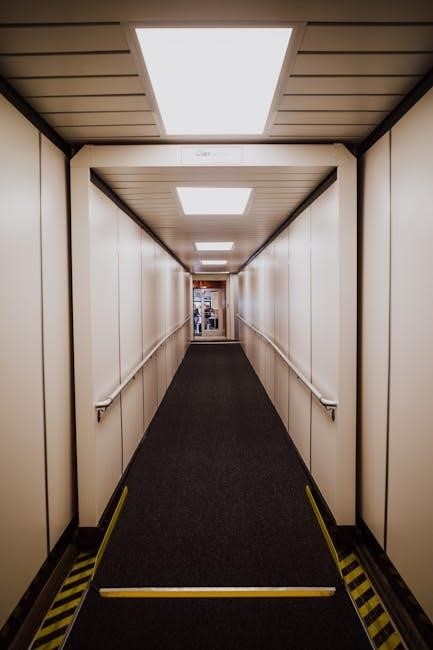The Hotel Trades Council (HTC) Industry-Wide Agreement is a landmark contract benefitting over 33‚000 hotel workers in New York‚ providing comprehensive health insurance‚ pensions‚ and unemployment benefits‚ ensuring improved living standards and workers’ rights through collective bargaining with the Hotel Association of New York.
Overview of the Hotel Trades Council (HTC)
The Hotel Trades Council (HTC) is a prominent labor union representing over 33‚000 active hotel workers in New York‚ advocating for improved wages‚ benefits‚ and working conditions. Established to protect the interests of hospitality employees‚ HTC has been instrumental in negotiating comprehensive agreements with the Hotel Association of New York‚ ensuring fair treatment and enhanced quality of life for its members. The union also administers the NYHTC & HANYC Employee Benefit Funds‚ which provide health‚ pension‚ and other benefits to over 90‚000 union members‚ dependents‚ and retirees. HTC’s efforts have historically focused on stopping concession bargaining and increasing workers’ power‚ making it a cornerstone of the hotel industry’s labor relations.

Importance of the Industry-Wide Agreement
The Industry-Wide Agreement is a pivotal contract that ensures fair wages‚ comprehensive health insurance‚ and robust benefits for hotel workers‚ significantly improving their quality of life. It has historically protected workers from concession bargaining‚ raising their standard of living and strengthening their collective power. The agreement also provides unemployment benefits and pension plans‚ offering financial security and stability. By addressing workers’ concerns and fostering better working conditions‚ it has set a benchmark for labor relations in the hotel industry. This agreement reflects the union’s commitment to safeguarding workers’ rights and has been instrumental in shaping a more equitable and sustainable future for hospitality employees in New York.
Historical Context of the Agreement
The Hotel Trades Council Industry-Wide Agreement has a rich history dating back decades‚ serving as a cornerstone for labor relations in New York’s hotel industry. Established to address the needs of thousands of workers‚ the agreement has evolved over the years‚ with significant milestones such as the 2012 negotiations led by HTC President Peter Ward. These talks‚ attended by nearly 6‚000 union members at Radio City Music Hall‚ highlighted the union’s determination to combat concession bargaining and improve workers’ standards. The agreement has been instrumental in reversing decades of decline‚ ensuring fair wages‚ health insurance‚ and pension benefits. Its historical significance lies in its role as a protective measure for workers‚ fostering a more equitable workplace and setting a precedent for future labor negotiations in the hospitality sector.
Key Provisions of the Hotel Trades Council Agreement
The agreement includes wage structures‚ health insurance‚ pensions‚ and unemployment benefits‚ ensuring improved living standards and workers’ rights through collective bargaining with the Hotel Association of New York.
Wage and Salary Structures
The agreement establishes competitive wage scales and salary structures for hotel workers‚ ensuring fair compensation across all roles. It includes annual wage increases‚ bonuses‚ and overtime pay protections‚ reflecting the union’s efforts to raise members’ standard of living. The wage structures are negotiated to account for industry standards‚ cost of living‚ and employee contributions. This provision has been instrumental in reducing income inequality and ensuring that workers share in the industry’s prosperity. The HTC’s focus on equitable pay has strengthened workers’ financial stability and job satisfaction‚ making the agreement a model for fair labor practices in the hospitality sector.
Health Insurance and Benefits
The agreement provides comprehensive health insurance and benefits‚ including medical‚ dental‚ and vision coverage‚ ensuring access to quality care for union members and their families. The Employee Benefit Funds‚ jointly administered by the HTC and the Hotel Association of New York‚ cover over 90‚000 members‚ dependents‚ and retirees. These benefits predated the Affordable Care Act‚ showcasing the union’s long-standing commitment to healthcare. The funds also offer pensions‚ life insurance‚ and disability benefits‚ enhancing workers’ financial security. This robust benefits package has significantly improved the quality of life for hotel workers‚ setting a high standard for the industry and reflecting the HTC’s dedication to safeguarding its members’ well-being.
Working Conditions and Safety Standards
The Hotel Trades Council Agreement prioritizes safe working conditions and stringent safety standards to protect employees across the hotel industry. The agreement mandates regular workplace inspections‚ enforced safety protocols‚ and the provision of personal protective equipment (PPE) to prevent injuries and illnesses. It addresses ergonomic practices to reduce physical strain‚ particularly for housekeeping and maintenance staff. Hotels are required to implement training programs on safety procedures and emergency response plans. The agreement also establishes clear guidelines for handling hazardous materials and ensures proper ventilation in work areas. These provisions aim to create a safer environment‚ reducing workplace accidents and promoting overall well-being for employees. The HTC collaborates with regulatory bodies‚ like OSHA‚ to enforce these standards industry-wide.
Dispute Resolution Mechanisms
The Hotel Trades Council Agreement establishes clear dispute resolution mechanisms to address conflicts between employers and employees. These mechanisms aim to resolve issues efficiently and fairly. The agreement outlines a structured grievance procedure‚ starting with informal discussions between the employee and management. If unresolved‚ disputes proceed to mediation‚ involving a neutral third party. If mediation fails‚ the matter moves to arbitration‚ where a binding decision is made by an impartial panel. The agreement also specifies timelines for each step to ensure prompt resolution. Additionally‚ it provides for the involvement of union representatives to support employees throughout the process. These mechanisms promote stability and trust in labor relations‚ ensuring that disputes are handled constructively without disrupting operations. The HTC also offers training to familiarize members with these procedures‚ fostering a collaborative approach to conflict resolution.

History of the Hotel Trades Council and the Agreement
Founded in 1937‚ the HTC emerged to unify hotel workers in New York City‚ addressing poor wages and conditions. The first Industry-Wide Agreement in 1938 set foundational labor standards.
Formation of the Hotel Trades Council
The Hotel Trades Council (HTC) was established in 1958 in New York City‚ emerging from the need to unify hotel workers under a single‚ powerful union. Founded by Jay M. Rubin‚ the HTC aimed to address the exploitative conditions faced by hotel employees‚ who often worked long hours for low wages with minimal benefits. The council’s creation was a response to the growing hotel industry’s failure to provide fair treatment to its workforce. By uniting workers across various hotel departments‚ the HTC sought to collectively bargain for better wages‚ improved working conditions‚ and stronger protections. This marked the beginning of a unified labor movement in the hotel sector‚ setting the stage for landmark agreements that would reshape the industry.
Evolution of the Agreement Over the Years
The Hotel Trades Council Industry-Wide Agreement has undergone significant evolution since its inception‚ adapting to changing industry dynamics and worker needs. Over the decades‚ the agreement has expanded to include enhanced wage scales‚ improved health benefits‚ and stricter safety protocols. Technological advancements and shifts in workforce demographics have also influenced updates‚ ensuring the agreement remains relevant. For instance‚ recent revisions have addressed issues like workplace diversity and digital tools in hotels. The HTC has consistently prioritized worker well-being‚ reflecting the changing expectations of employees and the industry. This continuous adaptation ensures the agreement remains a cornerstone of fair labor practices in the hotel sector‚ balancing employer needs with employee rights. Its evolution underscores the HTC’s commitment to fostering a sustainable and equitable work environment.
Major Milestones in Negotiations
Key negotiations have shaped the Hotel Trades Council Industry-Wide Agreement‚ marking significant achievements for workers. One major milestone was the establishment of the first comprehensive wage and benefits package in the 1930s‚ setting a precedent for fair labor standards. The 1960s saw the inclusion of civil rights and anti-discrimination clauses‚ addressing workplace equality. In the 1990s‚ negotiations focused on enhancing health insurance and pension benefits‚ ensuring long-term financial security for employees. Recent milestones include the adoption of sexual harassment prevention policies and wage increases tied to inflation. These milestones reflect the HTC’s dedication to addressing emerging issues and improving workers’ rights. Each negotiation has built on previous successes‚ creating a robust framework for the hotel industry.
Impact of the Industry-Wide Agreement
The agreement significantly improved wages‚ enhanced benefits‚ and set higher industry standards‚ benefiting both workers and establishments. It fostered economic stability and worker satisfaction.
Economic Impact on the Hotel Industry

The Hotel Trades Council Industry-Wide Agreement has significantly influenced the economic landscape of the hotel industry. By establishing standardized wage scales and benefits‚ it has increased labor costs for employers but also ensured a more stable and skilled workforce. This has led to improved service quality‚ enhancing the industry’s reputation and attracting more customers. Additionally‚ the agreement has set a benchmark for labor practices‚ prompting non-union hotels to adopt similar standards to remain competitive. While some hotels initially faced financial pressures due to higher wage bills‚ the long-term benefits of a motivated workforce and reduced employee turnover have offset these costs. Overall‚ the agreement has fostered economic stability and growth within the hotel sector.
Improvements in Workers’ Quality of Life
The Hotel Trades Council Industry-Wide Agreement has significantly enhanced the quality of life for hotel workers. By securing higher wages‚ comprehensive health insurance‚ and robust pension plans‚ the agreement ensures workers can better support their families and plan for retirement. Improved working conditions‚ including safer environments and reasonable workloads‚ have reduced stress and increased job satisfaction. Additionally‚ the agreement provides access to training programs‚ enabling workers to advance their careers. Enhanced benefits‚ such as unemployment assistance and paid time off‚ further contribute to financial stability. These provisions have collectively elevated the standard of living for hotel employees‚ fostering a more secure and fulfilling work-life balance. The agreement’s focus on worker well-being has set a benchmark for the industry.

Effect on Industry Standards and Practices
The Hotel Trades Council Industry-Wide Agreement has significantly influenced industry standards and practices. By establishing uniform wage scales‚ benefit structures‚ and working conditions‚ it has set a benchmark for fairness and equality in the hotel sector. The agreement has encouraged other hotels to adopt similar practices‚ fostering a more competitive and equitable labor market. It has also promoted safer workplaces by mandating stricter safety protocols‚ which have become industry standards. Additionally‚ the agreement’s emphasis on training and career development has raised the quality of service across the industry. Its impact extends to guest experiences‚ as improved worker morale and professionalism contribute to higher customer satisfaction. This agreement has played a pivotal role in shaping modern hospitality industry practices‚ ensuring a more sustainable and ethical business environment.
Negotiation Process and Key Players
The Hotel Trades Council and the Hotel Association of New York City are central to negotiations‚ ensuring fair agreements through collaborative yet often contentious discussions.

Role of the Hotel Association of New York
The Hotel Association of New York City (HANYC) plays a pivotal role in negotiating the Industry-Wide Agreement with the Hotel Trades Council; Representing hotel owners and managers‚ HANYC ensures that the interests of the hospitality industry are protected while addressing workers’ demands. The association engages in intensive bargaining sessions‚ focusing on wage scales‚ benefits‚ and working conditions. HANYC also collaborates with legal experts to ensure compliance with labor laws. Its negotiating team works to balance economic sustainability for hotels with fair compensation for employees. Through this process‚ HANYC has historically been a key driver of the agreement’s structure‚ aiming to maintain harmony between employers and unionized workers in New York’s competitive hotel industry.
Union Representatives and Their Strategies
Union representatives from the Hotel Trades Council play a crucial role in negotiating the Industry-Wide Agreement‚ employing strategic tactics to secure favorable terms for workers.Seasoned negotiators leverage their expertise to advocate for fair wages‚ improved benefits‚ and enhanced working conditions. They utilize aggressive bargaining techniques‚ often emphasizing the collective strength of union membership to influence employers. Additionally‚ union representatives collaborate with legal and financial experts to analyze proposals and counteroffers. Their strategies also include mobilizing workers through rallies and campaigns to demonstrate unity and solidarity. By prioritizing transparency and fairness‚ union leaders ensure that negotiations align with the long-term interests of employees‚ fostering a balanced agreement that benefits both workers and the industry as a whole.
Significant Negotiation Events
The Hotel Trades Council’s Industry-Wide Agreement has been shaped by several pivotal negotiation events. One landmark event was the 1990s strike‚ where thousands of workers protested for better wages and benefits‚ leading to a historic settlement. Another key moment occurred in 2018‚ when negotiations resulted in a groundbreaking contract that significantly raised wage scales and enhanced health insurance coverage. Additionally‚ the 2020 talks emphasized pandemic-related safety protocols‚ ensuring worker protections during unprecedented times. These events underscore the council’s ability to address evolving challenges while securing long-term benefits for its members. Each negotiation milestone reflects the collective strength and resilience of the union in advocating for fair labor practices.

Employee Benefits Under the Agreement
The agreement provides comprehensive benefits‚ including health insurance‚ pension plans‚ and unemployment support‚ enhancing workers’ quality of life and job security significantly.
Health and Pension Benefits
The Hotel Trades Council Industry-Wide Agreement ensures robust health and pension benefits for workers. Employees are covered under comprehensive medical‚ dental‚ and vision plans‚ with minimal out-of-pocket costs. The pension plan‚ administered through the New York Hotel Trades Council and Hotel Association of New York City Welfare Fund‚ provides a secure retirement framework. These benefits are negotiated to ensure long-term financial and health security for workers and their families. The agreement also includes provisions for disability and life insurance‚ further safeguarding employees’ well-being. These benefits are a cornerstone of the agreement‚ reflecting the council’s commitment to workers’ welfare and quality of life.
Unemployment Benefits and Support
The Hotel Trades Council Industry-Wide Agreement includes provisions for unemployment benefits and support‚ ensuring financial assistance for workers during periods of job loss. Eligibility is typically based on union membership and employment status. The agreement often provides enhanced unemployment benefits beyond state programs‚ offering extended coverage and higher benefit amounts. Additionally‚ the HTC may offer support services‚ such as job placement assistance and career counseling‚ to help workers transition back to employment. These benefits are designed to mitigate financial hardship and provide stability during unemployment. The HTC also collaborates with state agencies to ensure seamless access to these programs. This support underscores the council’s commitment to protecting workers’ livelihoods beyond active employment.
Other Perks and Services Provided
Beyond core benefits‚ the Hotel Trades Council Industry-Wide Agreement offers additional perks and services to enhance workers’ overall well-being. These include education and training programs to improve job skills and career advancement opportunities. Legal assistance is often provided to support workers and their families with various legal matters. Wellness programs‚ such as mental health resources and fitness initiatives‚ are also included to promote a healthy work-life balance. Additionally‚ the agreement may offer discount programs for services like childcare‚ transportation‚ and entertainment. Some plans even provide financial planning and counseling to help workers manage savings and retirement goals. These extras demonstrate the HTC’s commitment to supporting members both on and off the job.

Challenges and Controversies
The Hotel Trades Council Industry-Wide Agreement has faced challenges‚ including economic pressures‚ labor disputes‚ and negotiation tensions. These issues sometimes lead to strikes or prolonged discussions‚ impacting workers and industry stability.
Historical Challenges in Bargaining
The Hotel Trades Council (HTC) has historically faced significant challenges during bargaining for the Industry-Wide Agreement. In the mid-20th century‚ the union struggled with fragmented labor representation‚ leading to inconsistent wages and benefits across the industry. Employers often resisted union demands‚ resulting in prolonged negotiations and occasional strikes. Additionally‚ the diverse workforce posed communication barriers‚ complicating consensus-building. The HTC also faced opposition from non-union hotels‚ which undermined collective bargaining efforts. Despite these obstacles‚ the union persevered‚ leveraging its growing membership and strategic organizing to secure landmark agreements. These historical challenges shaped the HTC’s approach to negotiations‚ emphasizing unity and resilience in advocating for workers’ rights and fair labor practices.
Current Issues and Disputes
The Hotel Trades Council (HTC) currently faces challenges in maintaining harmony between workers and employers. One major issue is the impact of the COVID-19 pandemic‚ which reduced hotel demand and led to staffing shortages. This has caused disputes over wages‚ benefits‚ and working conditions. Additionally‚ the rise in unionization efforts has intensified negotiations‚ with workers demanding better compensation and job security. Automation and technological advancements in the industry have also sparked debates about job displacement. The HTC is working to address these concerns while ensuring fair labor practices. Recent disputes include conflicts with major hotel chains over contract renewals‚ particularly regarding wage scales and health benefits. These ongoing issues highlight the complexity of modern labor relations in the hotel industry.
Efforts to Address Worker Concerns
The Hotel Trades Council (HTC) has actively engaged in addressing worker concerns through targeted initiatives and negotiations. Recent efforts include advocating for enhanced wage scales‚ improved health insurance coverage‚ and stronger workplace safety protocols. The HTC has also focused on expanding training programs to help workers adapt to industry changes and technological advancements. Additionally‚ the union has prioritized mental health support for employees dealing with pandemic-related stress. By collaborating with employers and industry stakeholders‚ the HTC aims to create a more sustainable and equitable work environment. These efforts reflect the organization’s commitment to protecting workers’ rights while ensuring the long-term viability of the hotel industry.

Future of the Hotel Trades Council Agreement
The agreement aims to evolve with industry trends‚ ensuring fair wages‚ enhanced benefits‚ and sustainable working conditions while addressing future challenges and worker needs effectively.
Planned Updates and Revisions
The Hotel Trades Council Agreement is expected to undergo revisions to address emerging industry challenges and worker needs. Updates may include wage adjustments‚ expanded benefits‚ and enhanced safety protocols. The HTC aims to integrate new technologies and sustainability practices into the agreement. Additionally‚ there will be a focus on improving work-life balance and ensuring equitable treatment for all employees. These revisions will be negotiated collaboratively between the HTC‚ the Hotel Association of New York‚ and worker representatives. The goal is to maintain the agreement’s relevance while protecting workers’ rights and fostering long-term stability in the hotel industry. Regular reviews and stakeholder feedback will guide the updates to ensure they meet current and future demands. This proactive approach will help the agreement remain a cornerstone of labor relations in the hospitality sector.

Adapting to Industry Changes
The Hotel Trades Council Agreement is continually updated to reflect shifts in the hospitality industry. With rising demand for technology integration‚ the agreement now addresses automation and digital tools in hotels. Sustainability practices‚ such as energy-efficient protocols‚ are being incorporated to align with environmental standards. Changes in consumer expectations‚ like personalized services‚ are also influencing contract terms. The HTC ensures that workers are trained to meet these new demands‚ safeguarding their relevance in a competitive market. By staying attuned to industry trends‚ the agreement maintains its effectiveness in balancing employer needs with worker protections‚ ensuring long-term viability for both parties. This adaptability ensures the HTC remains a key player in shaping the future of hotel labor relations.
Long-Term Goals for Workers
The Hotel Trades Council Agreement prioritizes long-term goals for workers‚ focusing on career advancement and financial stability. The agreement aims to create pathways for professional growth‚ ensuring workers can progress within the industry. Enhanced job security provisions safeguard employees against unpredictable market fluctuations. Additionally‚ the agreement emphasizes retirement readiness through robust pension plans and savings initiatives. By fostering a culture of continuous learning‚ it encourages workers to acquire new skills‚ staying competitive in a dynamic job market. These measures collectively ensure that workers can build sustainable‚ fulfilling careers‚ aligning their personal aspirations with the industry’s evolving needs. This forward-looking approach underscores the HTC’s commitment to workers’ enduring success and well-being.
